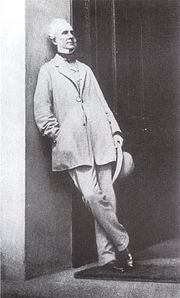William Gaskell | |
|---|---|
 William Gaskell on holiday in Scotland (photograph by Rupert Potter, father of Beatrix Potter) | |
| Born | 24 July 1805 Latchford, Cheshire, England |
| Died | 12 June 1884 (aged 78) Manchester, England |
| Education | University of Glasgow Manchester New College |
| Occupation(s) | Unitarian minister, educator |
| Spouse | |
| Children | 5 |
William Gaskell (24 July 1805 – 12 June 1884) was an English Unitarian minister, charity worker and pioneer in the education of the working class. The husband of novelist and biographer Elizabeth Gaskell, he was himself a writer and poet, and acted as the longest-serving Chair of the Portico Library from 1849 to his death in 1884.
His personal theology was Priestleian rationalism; he rejected the doctrine of original sin, believing humans to have an innate capacity for good, and this belief seems to have underpinned his lifelong commitment to charitable and educational projects.[1][2] Unlike many of his Manchester contemporaries, Gaskell always favoured social and educational work above political lobbying for free trade or factory reform.[1] His personal philosophy can perhaps be summarised in his dedication which he penned at the publication of his poetry collection Temperance Rhymes: 'to the working men of Manchester ... in the hope that they may act as another small weight on the right end of that lever which is to raise them in the scale of humanity.'[1]